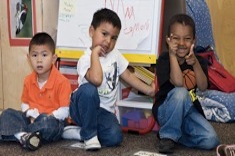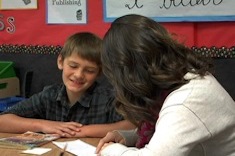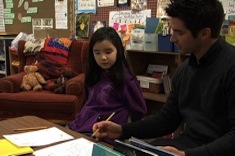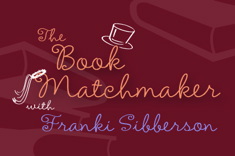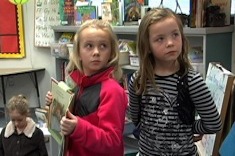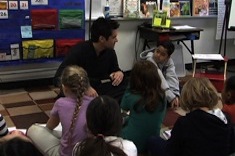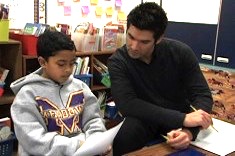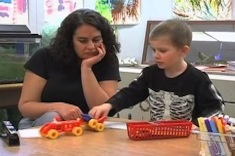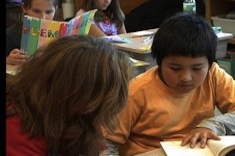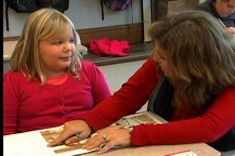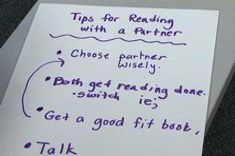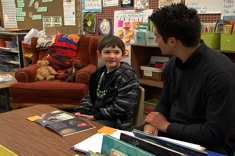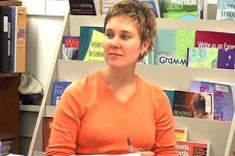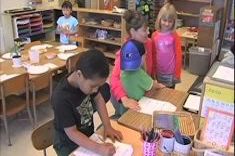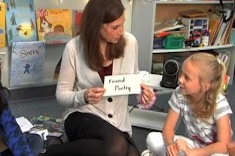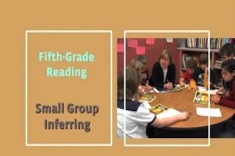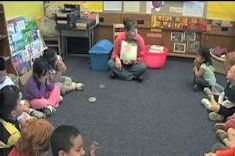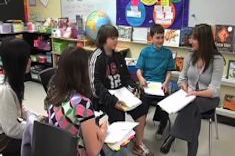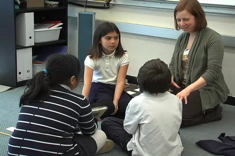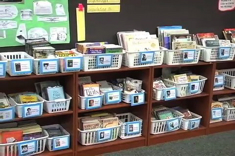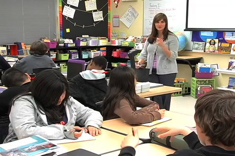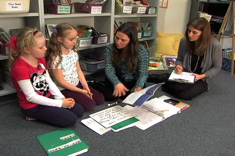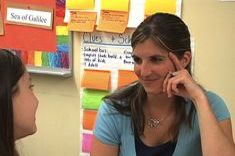Videos
Here is where you’ll find all the latest videos from our contributors. These videos are all captured in classrooms with crews using multiple cameras during regularly scheduled reading and writing workshops.
Latest Content
Preschool: Learning in Many Languages
Melissa Kolb explains how she supports many languages in her preschool classroom through the thoughtful use of volunteers and other resources in this three-minute video.
Tracking Thinking While Reading
Melissa Styger confers with a fourth-grade student using a template to help students track thinking and comprehension.
Mixing Information and Narratives
In this conference from a second-grade classroom, Sean Moore helps Mia flesh out her writing on friendship with examples.
Book Matchmaker: Read Aloud Versions of Old Favorites
Franki Sibberson presents some delightful versions of classic tales perfect for read alouds with youngsters.
Conferring, Rereading, and Comprehension
Aimee Buckner confers with Brendan, who is rereading Hoot and needs some strategies for holding his thinking.
Writing Workshop: Preparing for Publication
Beth Lawson helps her fourth-grade students work through a checklist of items to prepare for publishing early in the fall.
Launching a Punctuation Study in Second Grade
Linda Karamatic is launching a unit on punctuation with her second graders which includes mentor texts, inquiry, and anchor charts.
Enlisting a Student as Coteacher
In this second video in a two-part series, Sean Moore invites second grader Isaiah to present his learning to the class.
Conferring to Coteaching
In this first video in a two-part series, Sean Moore confers with second grader Isaiah. Sean prepares Isaiah to share what he is learning later in the writing workshop.
From Playing to Drawing to Writing in Preschool
Kelly Petrin guides Drew from playing to drawing and finally writing during this conference in her preschool classroom.
Writing, Graphic Organizers, and Mentor Texts
In this video from Sean Moore’s second-grade classroom, Sean demonstrates how to use a graphic organizer with his own writing as the mentor text.
Conferring for Engagement: First Steps
Aimee Buckner confers with a fourth grader who is learning how to choose books for independent reading. In this video, she gives advice in the first conference and then returns 10 minutes later for a follow-up meeting.
Conferring About Tracking Characters
In this video from a 4th grade classroom, Aimee Buckner confers with a student who is reading The Other Side by Jacqueline Woodson.
Partner Reading: Helping Peers Teach Peers
In this video from Linda Karamatic’s second-grade classroom, two girls meet with Linda to develop tips to share with their classmates on how to partner read successfully.
From Rages to Rags: Conferring with Conner
When to let a child guess, and when to give the correct answer in a reading conference? That's the struggle for 2nd grade teacher Sean Moore as he confers with Conner.
Discussing Observations with New Teachers
Jennifer Allen’s new teacher group discusses what they learn from classroom observations in this video taped early in the fall.
Rereading Strategy: Conferring with Emily
Sean Moore confers with 2nd grader Emily about the strategy of rereading for comprehending reading and writing.
Focused Independent Reading in Second Grade
Sean Moore demonstrates how he helps students focus their independent reading with preparation and then with discussion after reading.
Preschool Morning Sign-In
Melissa Kolb explains the social and academic value of morning sign-in for preschoolers.
Found Poetry in Second Grade
Linda Karamatic teaches a small group of her second graders about found poetry.
Inferring Small Group in 5th Grade
Karen Terlecky meets with a small group in her 5th grade class to discuss the strategy of inferring.
Preschool Read Aloud
Melissa Kolb talks about the power of read alouds for preschoolers and shares an example from her classroom in this video.
Guiding Groups in Middle School: Reading Poetry
Katie Doherty works with a small group of sixth graders who need extra support as they read the poem “Aspects of Autumn.”
Middle School Conferring About a Series
In this video from Katie Doherty’s sixth-grade classroom, Katie confers with a student who has returned to a series book she had previously rejected. Katie weaves in talk about strategies, particularly inferring (a focus of whole-class minilessons).
Book Club Meetings in 3rd Grade
Beth Lawson explains how she sets up book clubs in her 3rd grade classroom.
Grades 3&4 Room Tour
In this video tour, Franki Sibberson narrates a description of the grades 3&4 multiage classroom she shares with a colleague. The space is small, so Franki explains how storage areas are carefully arranged and seating is creatively designed to make the most of limited space.
Quick Take: Using Timers in Middle School Writing Workshops
In this video quick take, Katie Doherty explains why she finds a timer helpful in her middle school writing workshop.
Book Matchmaker: Read Alouds for 1st Grade
Franki Sibberson helps a 1st grade teacher select read alouds for her class in this installment of Book Matchmaker.
Listen In: Strategies for Using Nonfiction Texts in Writing
The line between copying and plagiarizing can be a difficult one for young students to understand. In this video, Heather Rader and Linda Karamatic share a humane strategy for helping two second graders craft nonfiction writing.
Conferring About Inferring
This reading conference from Katie Doherty’s middle school classroom builds on the whole-class lesson, and demonstrates the value of partner reading for older students.
Browse Content By
Type
Category
- Assessment Tools
- Big Fresh Archives
- Booklists
- Choice Numeracy
- Classroom Design
- Common Core
- Community Building
- Conferring
- Content Literacy
- Digital Literacy
- English Language Learners
- Equity
- Family Relations
- Free Samples
- Guiding Groups
- Leadership
- Literacy Coaches
- Mentor Texts
- Minilessons
- New Teacher Mentors
- Podcasts
- Poetry
- Quote Collections
- Reading Strategies
- Self Care
- Struggling and Striving Learners
- Talking and Listening
- Teacher Study Groups
- Teaching Reading
- Teaching Writing
- Word Study and Vocabulary
Author
- Melissa Quimby
- Nawal Qarooni
- Gwen Blumberg
- Julie Cox
- The Lead Learners
- Hannah Tills
- Josie Stewart
- Ruth Metcalfe
- Mallory Messenger
- Becca Burk
- Jodie Bailey
- Vivian Chen
- Mary Brower
- Tiffany Abbott Fuller
- Stephanie Affinito
- Ruth Ayres
- Leigh Anne Eck
- Heather Fisher
- Shari Frost
- Julie Johnson
- Suzy Kaback
- Gigi McAllister
- Shirl McPhillips
- Melanie Meehan
- Cathy Mere
- Debbie Miller
- Tara Barnett and Kate Mills
- Tammy Mulligan
- Dana Murphy
- Bitsy Parks
- David Pittman
- Brenda Power
- Heather Rader
- Matt Renwick
- Mandy Robek
- Christy Rush-Levine
- Gretchen Schroeder
- Jen Schwanke
- Brian Sepe
- Katherine Sokolowski
- Stella Villalba
- Jennifer Vincent
Grade Level
Choice Literacy Membership
Articles
Get full access to all Choice Literacy article content
Videos
Get full access to all Choice Literacy video content
Courses
Access Choice Literacy course curriculum and training

